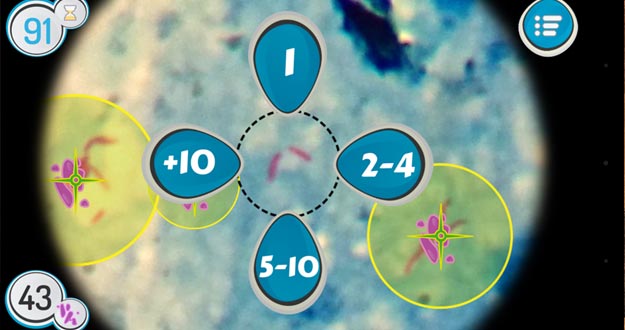Yesterday, I found a curious news, that said: “A video game helps diagnose tuberculosis collaboratively”.
A free videogame, named TuberSpot, helps diagnose new cases of tuberculosis, in a collaborative way. Identify the bacilli requires that a specialist observes, with a microscope, an average of 100 sample images and count the bacteria, a process that takes 30 minutes.
It is now proposed that players help identify bacilli, from images, in order to prevent people die, because their disease has not been diagnosed.

Tubercle bacilli identified with TuberSpot (in pink colour)
The game, available for PC and Android and soon for iOS –the operating system of Apple-- has been created, by a laboratory of the School of Telecommunications Engineering (ETSIT) of the Polytechnic University of Madrid, who has created a game, for help to diagnose malaria.
In the case of MalariaSpot, researchers studied more than 12,000 games played by volunteers, from a hundred different countries, and they found that, combining results of 22 players around the same image, data obtained were as accurate as by a specialist, collected by Efe .
The objective of TuberSpot is that the player identify many bacilli, as possible, in two minutes. The image of these bacteria, that cause tuberculosis, images come from samples of sputum –a fluid that you expel when you cough--, explain its creators.
To distinguish the bacilli, they have a tutorial, and once identified, the player has to "point and shoot". They also have to avoid a confusion, with what the creators have called 'guarratos', a bacteria, that look like bacilli are not.
The score is generated, when the bacilli, detected by the player, are compared with the previously, identified by experts, and the first hits.
Researchers, from the lab ETSIT, claim that, if the game works, they will be introduced, in future releases, images that have not been yet inspected, by specialists, to help diagnose new cases.
So, they should like to establish a specialized unit of players-workers, able to help diagnose diseases online and develop new games, across all platforms, to minimize the time, required to analyze the samples.
Another initiative, planned, is to develop a microscopy system-on-a-phone-mobile, for remote diagnostics, where field workers and health centres can transfer data, directly, to make a quick analysis.
TuberSpot has been funded by the Polytechnic University of Madrid, the Ahoska Foundation, the Centre for Biomedical Research Network in Bioengineering, Biomaterials and Nanomedicine and the Spanish Foundation for Science and Technology (from the Ministry of Economy and Finance).
Well, I think that new technologies are playing a very important role, even though in Medicine. So, I am agree with this new project, where researchers can work with data, online, to help people quickly.
Until my next post, kind regards,
Luis.
Sponsored by Costaluz Lawyers.
Please click below:
